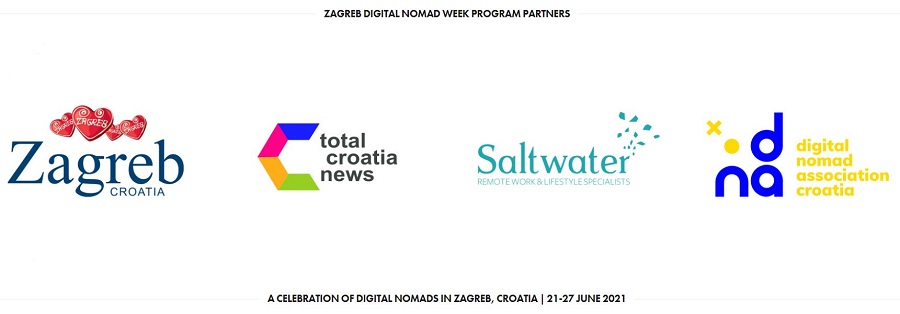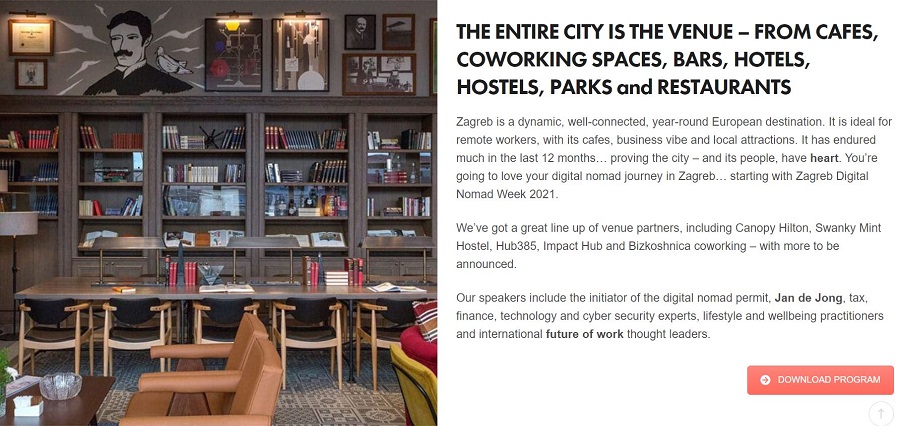Lokrum Reserve Rabbits Endangered
May 11, 2021 - The Lokrum Reserve will be open to visitors from May 15. For the first time this year, the people of Dubrovnik have a special benefit - free transportation and a visit to the Reserve throughout the season, regardless of the number of departures.
It is enough to present proof of a place of residence to visit the island for free. The favorite beach and picnic area of the people of Dubrovnik were supposed to open its doors last Saturday. Still, the planned opening was postponed after determining that part of the Lokrum rabbits were infected with the hemorrhagic disease.
As Dubrovački Vjesnik reports, the Lokrum Reserve confirmed that a detailed analysis conducted by the Croatian Veterinary Institute confirmed the disease in rabbits and the findings were notified to the State Inspectorate of the Republic of Croatia, and the veterinary inspector performed the supervision. It was decided to conduct an additional detailed examination of the entire island to identify the presence of infected individuals, said the Lokrum Nature Reserve, and especially point out that this disease can not be transmitted to humans or other animals, but also through indirect contact with pathogens, for example, through clothing or footwear, it can take off the island and endanger other rabbits on the mainland.
To minimize the risk of disease in rabbits - pets or individuals in commercial breeding, Lokrum Reserve has decided to postpone the opening until May 15. By then, the infectivity and the possibility of contact with the remaining biological material will be significantly reduced. All this was done to protect the people of Dubrovnik who have rabbits at home because the disease for rabbits is highly transmissible and deadly, points out the Public Institution Lokrum Reserve.
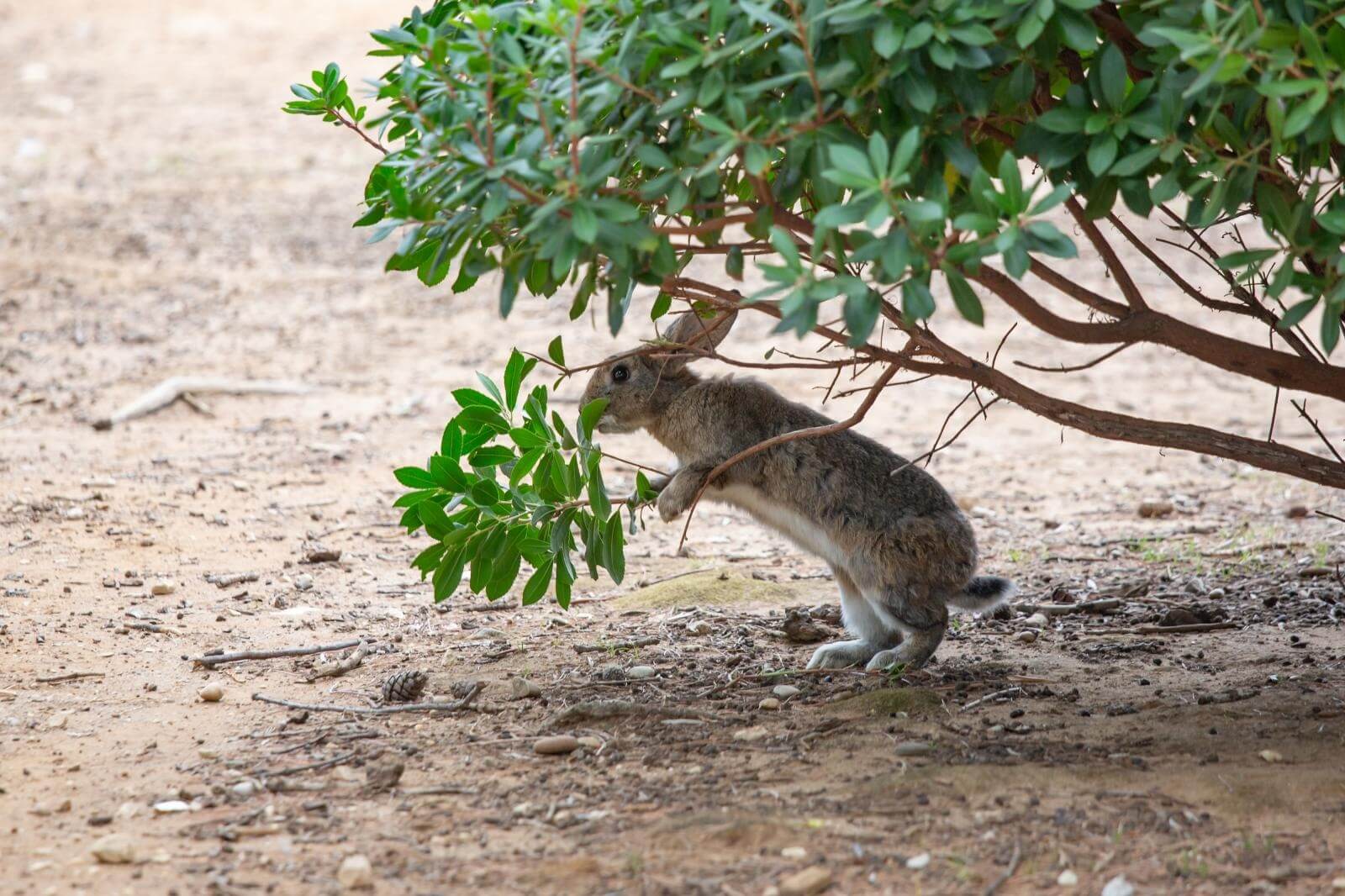
Grgo Jelavic
According to veterinary data on rabbit hemorrhagic disease, up to 80% of animals become ill with the first appearance of the virus in the non-immune rabbit population in just a few days, and mortality reaches almost 100 percent. The disease passes in 2-3 days, and the rabbits that survive are resistant to re-infection. Cubs up to two months old are also immune to the disease. The Croatian Veterinary Institute received a finding confirming the presence of this virus in Lokrum rabbits on April 24, so it is not certain how many individuals have been infected and died on the island since then. How many rabbits are still alive could not be confirmed by Nikolina Grković; while she wrote, she did not perform a detailed inspection of the island.
Along with peacocks, tame Lokrum rabbits have been a favorite attraction for all visitors for years, although due to their number and intensive grazing, many plant species in the Reserve have died. Namely, rabbits were brought to the island and released into the wild by an unknown person about ten years ago. They have since multiplied so much that they almost destroyed the island's greenery, so this spring, the Lokrum Reserve decided to hunt rabbits and peacocks and move to different places in Croatia. This has caused numerous controversies among animal lovers, especially on social networks. Still, the fact remains that the Lokrum Reserve must protect forest vegetation for which it was established and protect from extinction endangered and rare habitat types and species and valuable garden heritage on Lokrum.
That is why the Game Protection Program "Lokrum Island" was adopted in 2016, according to which the number of invasive species should be reduced. The relocation plan for rabbits and peacocks was adopted for a ten-year period. Still, judging by the presence of the deadly virus for rabbits, the so-called rabbit plague, the question is how many of them will be greeted by the first visitors to Lokrum at all.
For more on travel in Croatia, follow TCN's dedicated page.
Two New Ryanair Flights to Zagreb Announced from September!
May 11, 2021 - The latest flight news to Croatia as two new Ryanair flights to Zagreb have been announced from September!
Croatian Aviation reports that Ryanair released tickets for two more new routes to Zagreb Airport today!
As previously announced, the Irish low-cost airline will open a base at Zagreb Airport from September this year.
In addition to the already announced, 12 new lines, Ryanair will operate directly to two more destinations from Zagreb from September.
From September 4, the Zagreb - Malmo - Zagreb line will be introduced, which will be in traffic twice a week, on Tuesdays and Saturdays.
From the same date, the Zagreb - Dusseldorf Weeze - Zagreb line will be introduced, which will also operate twice a week, on Tuesdays and Saturdays.
Tickets for these two new routes are already on sale on the airline's official website, and these lines will also operate in the winter flight schedule. According to the latest announcements, Ryanair will have as many as 14 international routes from Zagreb Airport from the beginning of September, leaving the possibility of introducing additional lines until the start of operations and the opening of the base in September.
Already this autumn, Ryanair will perform weekly flights from Zagreb Airport to the following destinations:
Brussels Charleroi, from June 2, 3 times a week,
Dortmund, from September 3, 2 times a week,
Frankfurt-Hahn, from September 3, 3 times a week,
Gothenburg, from September 3, 3 times a week,
Karlsruhe, from September 2, 2 times a week,
London, from September 1, daily,
Memmingen, from September 3, 2 times a week,
Milan, from July 1, 4 times a week,
Paris, from September 2, 2 times a week,
Podgorica, from September 4, 2 times a week,
Rome, from September 3, 3 times a week,
Torp Sandefjord, from September 1, 2 times a week.
The company has more than 430 B737-800 aircraft in the fleet, with a capacity of 189 seats. The average age of Ryanair aircraft is only 8 years.
Ryanair has been operating in Croatia since 2006. By June 2019, the company had transported 4 million passengers to and from Croatia.
Follow the latest on flights to Croatia HERE and the latest travel updates and COVID-19 news from Croatia HERE.
For more on travel in Croatia, follow TCN's dedicated page.
Zagreb Digital Nomad Week 2021 Announced by Saltwater Nomads/Zagreb Tourist Board
May 11, 2021 - The digital nomad buzz in Croatia is about to get even louder, with the announcement of the Zagreb Digital Nomad Week 2021 & the Digital Nomad Ambassador Project.
The future of work is evolving, and Croatia is in a great position to take advantage of the new reality with its unbeatable combination of safety, authentic experiences, and lifestyle.
The global pandemic has highlighted even more the lifestyle and opportunities for digital nomads around the world, and Croatia has been one of the quickest countries to seize the opportunity. Thanks to the efforts of Dutch entrepreneur, Jan de Jong, and his team, the Croatian digital nomad permit became a reality on January 1, 2021. A number of permits from as far away as Guatemala have so far been approved.
And the digital nomad eco-system is developing nicely in Croatia, an eco-system which will be strengthened by a new project announced today and funded by the Zagreb Tourist Board, in cooperation with Saltwater Nomads, the Digital Nomad Association, and Total Croatia News. Welcome to the Zagreb Digital Nomad Week 2021 & the Digital Nomad Ambassador Project.
The first part of this innovative project, Zagreb Digital Nomad Week 2021, will take place from June 21-27, at various partner locations around the Croatian capital.
Seven themes for 7 days, with one day focused on the following: cyber security, online presence, remote careers, tax & finance, future of work, wellbeing and exploring Zagreb.
The week will showcase the whole city, with events being held in hotels, hotels, coworking spaces, bars, cafes, and parks, with each evening featuring a different theme.
Zagreb Digital Nomad Week 2021 is aimed at current and even “wannabe” digital nomads and remote workers. Croatia’s new legislation has really put it on the map for the global remote workforce - the organisers expect to see a diverse group of professionals coming to Croatia in years to come, with Zagreb as a top choice.
You can see an overview of the program here, with a detailed look at the daily activity here.
Zagreb Digital Nomad Week 2021 will kick off at Canopy by Hilton on June 21, before moving to other partner locations, including Swanky Mint Hostel, HUB385, Bizkoshnica and Impact Hub.
A second component of the initiative is the Digital Nomad Ambassador Project, which will see one lucky nomad in residence as a guest of Zagreb for a month, starting on July 1 until December 31. This will allow nomads to experience the magic and diversity of this vibrant city, with its changing seasonal experiences over a six-month period.
The Ambassador project is expected to be another way Zagreb demonstrates its warmth and the winners will show the diverse, year-round offer and lifestyle you can enjoy here - whether you come alone, as a couple or even family. There’s a lot happening and with a regular work schedule, one month is just a taste of life in Zagreb.
Applications for the Ambassador project are now open on the Saltwater Nomads website.
Zagreb Tourist Board has worked hard to diversify its tourism in the wake of the double blow of the pandemic and devastating earthquake. Its partnership with the county tourist board in the Around Zagreb project has been a big success, opening up new tourism possibilities to visitors to the city. This digital nomad strategy is an extension of that strategy.
For more about digital nomad tourism in Zagreb, visit the Zagreb Tourist Board dedicated page.
For the latest on digital nomads in Croatia, follow the dedicated TCN section.
Unexpected Twist in Borna Sosa Story Leaves German Football Federation Embarrassed
May 11, 2021 – The Borna Sosa story has stirred quite a bit of commotion with his announcement of switching national teams from Croatia to Germany. The story got a new twist that might complicate things even more.
Even though the football season is almost over the news of the day in Croatia is one about Borna Sosa. This talented 23 years old left-back player is exactly what the national team needs now. His outstanding performances both in his club and Croatia U21 national team made him a young player to watch. But it wasn’t just Croatian officials that were watching him.
German Football Federation was quick to approach the player. They managed to sway him to come to play for the German national team. Borna’s mother was born in Germany and he now has the legal right to claim German citizenship. The decision was a shocking one for the Croatian football public and especially painful given the specific talents and the position Borna Sosa excels at. We have already reported on the details of this story as well as on the interview in which he explained his decision. The case seemed pretty much closed. However, the latest news out of Germany puts another shocking spin on the entire story.
The Final Twist?
In order to have Sosa playing for the German national football team after already playing for the Croatia U21 team, he needs permission from FIFA, football’s global governing body. As index.hr reports, there is a new clause added in FIFA rulebook since September 2020 that states a player switching national teams needed to already have had citizenship of the nation he is switching to before he played for the national team he is switching from. In other words, Borna Sosa needed to already have had dual Croatian and German citizenship at the time when he played for the Croatia youth team. Borna Sosa applied for German citizenship this year, so this is not the case. Because of this, FIFA will most probably decline the German request.
This is quite a shock, not just because of the fact Sosa might not be allowed to play for Germany. It is very unusual for a serious football association to make a mistake like that, not checking basic rules and regulations. If FIFA decides to disallow this change in national teams, this will be quite an embarrassing episode for German officials. Going public with announcements of Sosa’s possible place in the national team might backfire spectacularly.
At the end of the story, Croatia might end up with the left-back player the fans were dreaming of. The question is, will there be bad feelings after the Germany saga.
To follow the latest sports news in Croatia, follow TCN's dedicated page.
To learn more about sport in Croatia, CLICK HERE.
Archaeological Park Iovia - Ludbreg Officially Opens!
May 11, 2021 - The archaeological park Iovia - Ludbreg was ceremoniously opened in Ludbreg on Monday as one of the city's largest and most important projects.
First, the news of the opening of the new archeological park Iovia - Ludbreg on Monday:
Podravski reports that the museum was opened by the Minister of Culture and Media, Ph.D. Nina Obuljen Koržinek with the mayor of Ludbreg Dubravko Bilić and the director of the restoration institute and honorary Ludbreg citizen, doctor of science Tajana Pleše.
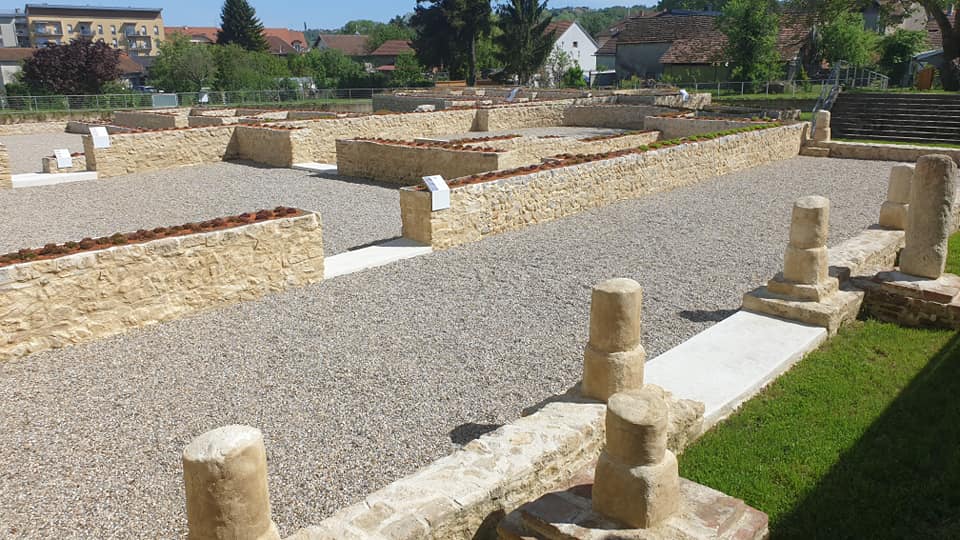
"It is not every day that archeological sites are opened, arranged, researched, and presented in this way, organized according to all international standards, and look how archeological parks should be developed and managed. This locality and other projects funded by the European Union have an important tourist component. When the pandemic situation calms down, this will certainly be one reason for visitors to come to Ludbreg. It is a real pleasure to witness an event like this at this time, and I believe that today's opening is an encouraging announcement of returning to life as we knew it before the pandemic," said Minister Obuljen Koržinek at the opening and thanked everyone who participated in the project.
The mayor of Ludbreg, Dubravko Bilić, said that Ludbreg is a city that is recognized for using European funds. The archeological park project is one of the most important city projects.
"This project was for us the first large registered project that turned Ludbreg into a city of European projects. I remember how much effort and time was put in by everyone who worked on the application to finally submit the application on the last day and thus knock on Europe’s door. Fortunately, the project was approved and received 14.3 million kuna in grants, while the rest came from the Ministry of Regional Development and the City of Ludbreg. In the end, the value will be close to 19 million kuna. The importance of the project is, on the other hand, invaluable because it activates all our potentials in tourism and the economy and presents Ludbreg as a rich place where visitors have something to see," said Mayor Bilić in part of his address and thanked everyone who helped implement the project.
The director of the restoration institute and honorary citizen of Ludbreg, doctor of science Tajana Pleše, also addressed the audience, emphasizing in an emotional speech that such parks are extremely rare and that it is a great honor to be a part of it.
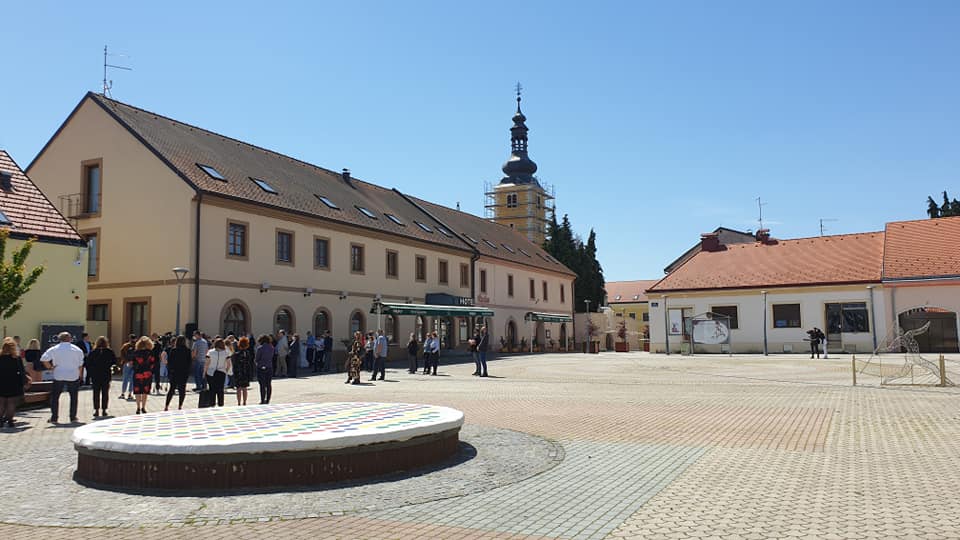
As the presentations continued, I took a step back to take some pictures, and I was struck by just how much of interest there is in this unusual town. I have been mildly fascinated with Ludbreg since my first visit back in 2016 when I wrote Ludbreg, the Most Fascinating, Unusual Little Town in Croatia? And every visit brings something new, in this case the opening of Archeological Park Iovia.
Here, in just a few square metres, in a quiet destination not known for tourism, we can see the Centre of the World, the church which houses the only certified miracle in Croatia, a monument to local javelin heroine, Sara Kolak, who won Olympic Gold in Rio in 2016, and the newly opened museum and park.

As most destinations are tightening their belts, Ludbreg's chiefs are investing to improve both the town and the tourism offer. It was great to catch up with the King of Straw, as he put the finishing touches to his straw model of Ludbreg's oldest lady, Erika the rhino.
Marc Rowlands' feature story yesterday on the rise of active tourism in and around Ludbreg shows that tourism is very much alive in this part of continental Croatia.
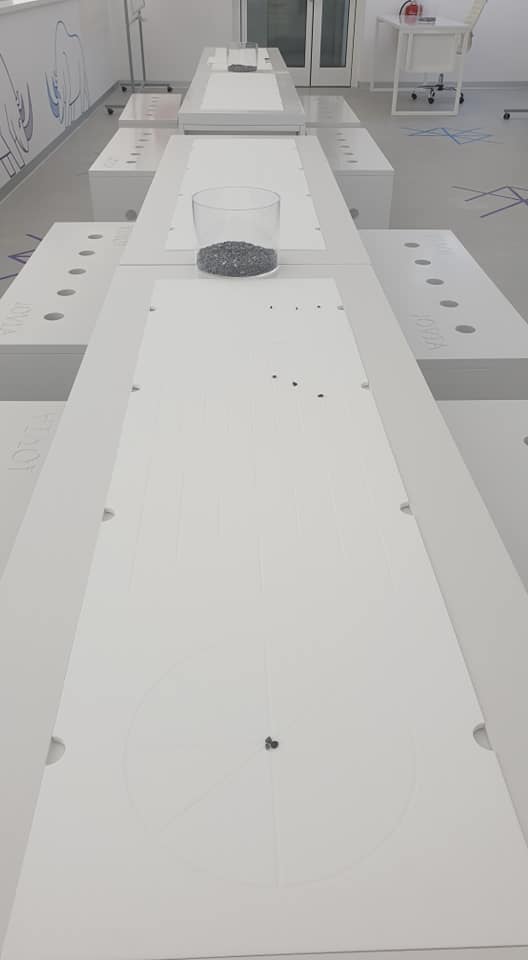
I really liked the layout of the three-storey museum in front of the park. The top floor will be great for workshops.
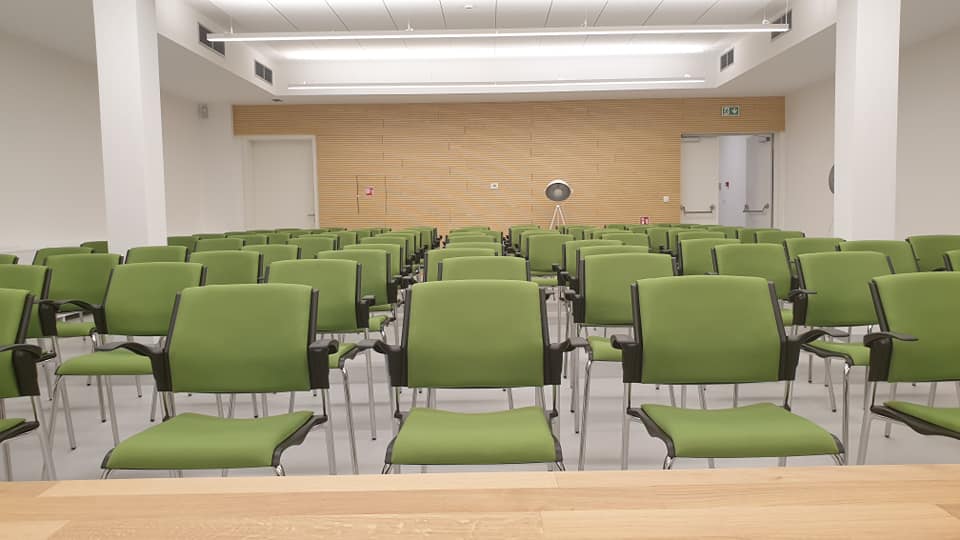
And a new conference facility in the basement.
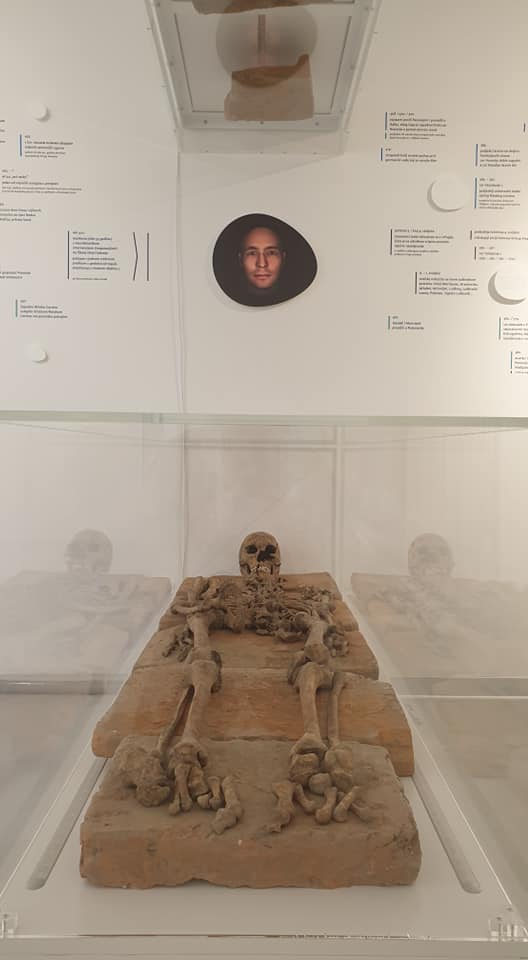
As for the exhibition itself, it was perfectly presented, even if some of the exhibits made me feel empathy after all my recent stress and travel.
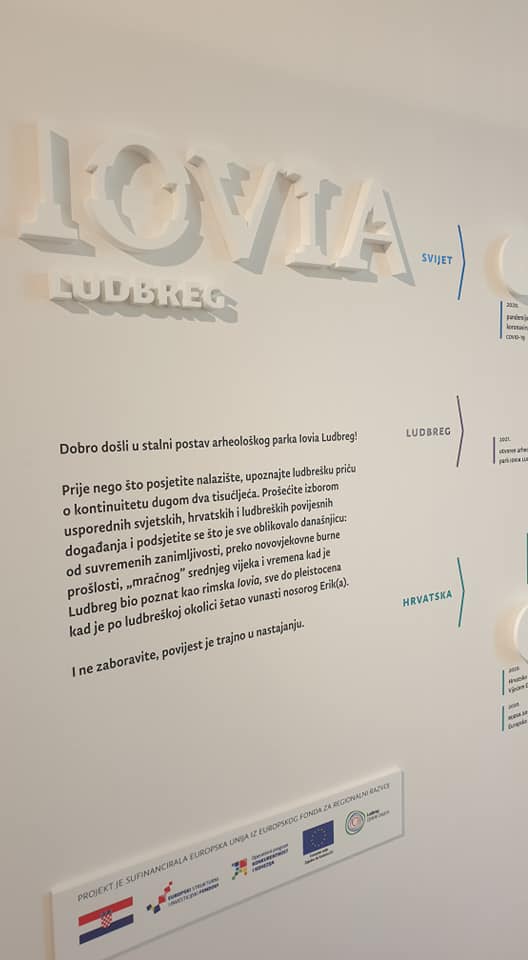
Three clear timelines, side by side - Croatia, the world, and Ludbreg. While the exhibition on the wall is in Croatia, it is available in several languages via multimedia.
A great addition to an already interesting town, which you can get to know in more detail with our One Minute Ludbreg series, in association with the Ludbreg Tourist Board, starting with the story of that miracle.
To learn more about Ludbreg, visit the dedicated TCN section.
For more, follow Made in Croatia.
Aegean Airlines Cancels Athens-Zagreb Flights this Summer
May 11, 2021 - The latest flight news to Croatia as Aegean Airlines' Athens-Zagreb flights will not operate this summer.
Croatian Aviation reports that Greek national airline, Aegean Airlines, has stopped selling all tickets on the direct route between Athens and Zagreb for this summer season.
Greece's national carrier withdrew ticket sales this weekend on a regular route between Athens and Zagreb Airport. Although in mid-January this year, the company announced the reintroduction of regular lines from Athens to Zagreb, Split, and Dubrovnik, in the meantime, there have been operational changes.
As announced earlier, the line to Split was canceled, while the first flights to Zagreb and Dubrovnik were announced for May. The company has now further reduced its network of destinations for the summer season, with no connection to Zagreb available.
Aegean Airlines launched a regular flight between Athens and Zagreb in May 2018 and operated on it three times a week with DashQ400 aircraft. The line also operated in the winter flight schedule but reduced, with a short break in January and February 2019.
At the end of 2019, the company announced that it would introduce larger aircraft on the route to Zagreb in the 2020 summer season (A319 and A320 aircraft), but this did not happen due to the global pandemic, and the route was suspended. Although according to the company's announcements, Aegean was expected to operate to Zagreb in the summer of this year, according to the latest information, this will not happen, and the chances that the line will be renewed in the winter flight schedule this year are almost non-existent.
The only destination of the Greek national airline this summer in Croatia is Dubrovnik, according to which Aegean Airlines planes should operate from June 19, initially twice a week, on Tuesdays and Saturdays.
Zagreb remains connected to Athens by the regular line of Croatia Airlines (with a stop in Dubrovnik), which should start operating on Thursday, July 1. Flights on this line are announced three times a week; on Tuesdays, Thursdays, and Sundays, and tickets are on sale on the official website of Croatia Airlines.
Follow the latest on flights to Croatia HERE and the latest travel updates and COVID-19 news from Croatia HERE.
For more on travel in Croatia, follow TCN's dedicated page.
AquaWeb Tests Possibility of Getting Water from Air for Agriculture in Zadar
May the 11th, 2021 - One Zadar-based test run by AquaWeb is seeing how much water can be obtained from the air in a bid to help out agriculture and other forms of food production in Croatia.
As Poslovni Dnevnik/Suzana Varosanec writes, the very first biomimetic company in Croatia operates under the name CROdelicious, the director is Ana Yael Prelog, while the co-owner, known for numerous international environmental projects, is Croatian-American scientist Anamarija Frankic, who teaches coastal ecosystem management and biomimicry at the University of Massachusetts.
The American team in which her students participated in the creation of the biomimetic design of AquaWeb, which involves obtaining water from the air for local food production, won two international awards. Back in 2017 it took home first prize at the Global Biomimicry Design Challenge, as well as the Ray of Hope Prize.
Today, AquaWeb design in Croatia is marketed through CROdelicious, and the system will be tested out on the agricultural property of the University of Zadar - Bastica. At this stage, it is still a pilot project, implemented in cooperation with the Zadar County Development Agency Zadar Nova, meaning that the planning, design and construction of AquaWeb has played a key part of the "AdriaClima" project which is worth a total of 8.8 million euros.
"In general, the goal is to strengthen the adaptation and resilience of local communities to climate change, which we're witnessing today," said the director of the aforementioned development agency Marina Dujmovic Vukovic.
This innovative solution by AquaWeb is based on the absorption of water from the air and its subsequent storage, and according to Frankic, AquaWeb wants to show how it is possible to ensure on-site water availability and the proper irrigation of small agricultural areas, especially in periods of water deficit.
''AquaWeb acts as an absorbing infrastructure for atmospheric water, mimicking the way a spider's web collects water, water storage techniques modelled on various succulent plants, then the transportation of the water like mycelium and structural support in the form of honeycombs. In nature, there are hydrophilic and hydrophobic nanostructures in which different species in nature absorb water from the air. Therefore, this project is based on nanotechnologies,'' explained Frankic, adding that she got Fulbright to establish a course in Biomimicry at the Department of Ecology, Agronomy and Aquaculture at the University of Zadar.
In a wave of rapid development, especially over the last 25 years under the pressure of climate change, in parallel with the search for answers to this great threat to the economy, biomimicry is entering into all pores of modern business. It is also present in all scientific disciplines, biomimetic technology, medicine, architecture, design, engineering… It is estimated that about 45 billion US dollars account for investments managed by companies that support bioinspired innovations. Frankic claims that solutions on this basis do exist in Croatia, they're just not typically recognised and many are not even known of.
AquaWeb's new initiative for a greater impact of the principle of biomimicry on the business of entities in various industries is already attracting interest and cooperation. A team of young experts, including Matej Vucic (biology), Naum Kiceec (marketing), Marin Bosnjak and Marko Mataic (IT), is creating the first Croatian startup for agriculture based on biomimetics. They intend to put the projects they are preparing for EU funding into money through cooperation in agricultural production, including the networking of interested family farms (OPGs), as well as the introduction of this approach to other activities in a multidisciplinary way, from the construction sector to that of energy.
''Our idea is to facilitate business processes based on biomimicry and through innovative technologies to gain greater value, not only in business on self-sustainable principles, but for society as a whole, our environment and the entire country,'' stated Kiceec.
Biomimicry is gaining more and more importance, explained Frankic, because there is no waste in nature, everything is efficient, multifunctional and sustainable on the basis of collaboration, and not just in competition as we're taught. In biomimicry, we can learn how to be self-sustaining, thus, based on the results of monitoring in Zadar's Bastica, guidelines will be planned for the further implementation and application of innovative technologies and ''nature based'' biomimetic solutions in agriculture and in self-sustainable local development.
Depending on the results, activities and planning for potential commercial production will continue, and given climate change and the dire need for water, the sky quite literally is the limit for AquaWeb's praiseworthy idea.
For more, follow our lifestyle section.
Zagreb Delt Papir Company's Products Present on Foreign Markets
May the 11th, 2021 - The Zagreb Delt Papir company did well over the last year as the coronavirus pandemic swept through Croatia, Europe and the rest of the world and we needed more... toilet paper.
As Poslovni Dnevnik/Sergej Novosel Vuckovic writes, the pandemic which struck during spring last year was a prime time for production for the Zagreb Delt Papir company, and it was necessary for them to work in three shifts at their Jankomir plant, because due to the general shortage of toilet paper throughout Europe, many turned to them to meet their increasing demands.
The Zagreb Delt Papir company sometimes had to reject requests for more of their products, but despite that, the whole of 2020 can be considered successful for this enterprise, not only by the fact that with revenues of 130 million kuna they approached the levels of their record year of pre-pandemic 2019, but also because of the fact that at the end of the year they started working on the conceptual design of their brand new Ola’la products.
Launched only relatively recently, a few years after their last hit, which was lemon-scented kitchen towels, the Zagreb Delt Papir company has marketed new types of rolls of paper towels and toilet paper.
“We started this story by deciding to make a roll of paper towels that is very tall, as tall as 27 centimetres, and the cellulose we use has much stronger absorbent properties and pronounced strength. We focused on gathering the experiences of our customers and designed a product tailored to every modern household - Ola’la Butler paper towels in three packaging variants. The product is for every household, regardless of whether the person spends very little time there or a lot (today a large number of people work from home),'' stated the directors and co-owners of the Zagreb Delt Papir company, Krunoslav Kisak and Alen Krajacic.
The Zagreb Delt Papir products also meet strict environmental certificates, since their so-called ''I’m green foil'' is made from 60 percent green polyethylene derived from sugar cane.
We're paying more and more attention to the materials, so we "wrapped" the entire professional segment in ''I'm green'' foil. In the production process, we recycle all recycled surpluses and reuse them in certain products,'' they explained from Delt Papir. The new paper, Ola’la Premium, is said to be made with new technology.
"We use super soft, but very durable cellulose that leaves a soft touch on the skin. We believe that there can be no room for compromise when it comes to personal hygiene because, as we've been witnessing for more than a year now, it's extremely closely related to health,'' the company's leaders noted.
With cellulose, as an unsustainable raw material in the production of a necessary item, things are becoming more difficult and more expensive.
''The prices of raw materials have been rising sharply for all raw materials, especially when it comes to paper and packaging (cardboard and foil), and accordingly, production prices are rising sharply. The predictions are that it will continue to grow, and we're following the trends with the hope that this disturbance on the market will slowly come back under control,'' they explained. Since they're innovating as a company, at the beginning of last summer they were able to adapt to the conditions of the pandemic and introduce a new product: protective masks, which were also in short supply on the market, even in the case of those produced in China.
"Yes, last year we decided to go with a new production segment practically overnight because we struggled with the purchase of protective masks for our employees. Today, we're present in large retail chains such as Lidl and Kaufland, and more recently on the shelves of Dm, and we also supply various distributors. The market struggle with cheaper Chinese goods is of course present, but given our certifications and Croatian production, we try to be competitive and continue with this segment because the demand for masks is actually increasing. So far, we've produced and sold more than ten million masks,'' stated Kisak and Krajacic.
The Zagreb Delt Papir company currently has 85 employees, with their number growing to 100 in the event of higher demand for their products. The company exports 53 percent of its production to 26 countries, to most of the EU and Switzerland, and their new markets are Finland, Iceland, Dubai, Saudi Arabia and Kuwait.
For more, follow Made in Croatia.
Justice Ministry Confirms: Brits Can Purchase Croatian Property
May the 11th, 2021 - With Brexit finally over after what seemed like an endless period of news headlines about the 2016 referendum which caused a deep rift for the British public with the question of all questions - mopping up and tying up loose ends has begun. The Justice Ministry has just confirmed that Brits may purchase Croatian property.
As UK in Croatia, the British Embassy in Croatia's platform announced on Twitter, British nationals are free to purchase Croatian property despite no longer being citizens of the EU.
As the Ministry of Justice writes, if you're a citizen or a legal entity from any of the EU member states, you acquire the right of ownership of property in the Republic of Croatia under the preconditions valid for the acquisition of ownership for Croatian citizens and legal entities based in the Republic of Croatia. In this case, you do not need the consent of the Minister of Justice and Administration in order to acquire Croatian property rights.
If you're a citizen of the Swiss Confederation, you acquire the right of ownership of real estate in the Republic of Croatia under the preconditions that apply to the acquisition of property rights for citizens of the Republic of Croatia and legal entities based in the Republic of Croatia, except in the case of property in what are listed as exempt locations, and again, the consent of the Minister of Justice is not required to purchase Croatian property. When submitting a proposal for registration of ownership to the competent land registry court, you should enclose with other documentation a confirmation of your application for temporary residence.
Foreign nationals from outside the EU and the Swiss Confederation
Giving consent for the acquisition of property rights of foreign persons in the Republic of Croatia is decided in administrative proceedings at the request of a foreign person intending to puchase Croatian property or otherwise acquire ownership of a property, if you're a citizen of a country with which there is reciprocity with Croatia in this regard.
The procedure is conducted in accordance with the provisions of the Law on Property and the Law on General Administrative Procedure. The request (which must be written) must be submitted directly to the competent office or sent by mail to the following address:
Ministry of Justice and Administration of the Republic of Croatia
Directorate for Civil, Commercial and Administrative Law
Ulica grada Vukovara 49, 10000 Zagreb
The written request must be accompanied by:
- The legal basis for the acquisition of ownership (a purchase contract, a gift contract, a maintenance contract, etc.) in the original or a certified copy,
- Proof of ownership of the seller of the property in question, ie an excerpt from the land register,
- A certificate of the administrative body responsible for urban planning and physical planning, according to the place where the property is located, on the legal status of the property (example: whether or not the property is located within the construction area provided by the urban plan),
- Proof of citizenship of the acquirer (a certified copy of their passport, etc.) or proof of the status of a legal entity (such as an excerpt from the court register), if the acquirer is a foreign legal entity,
- In the case of the applicant being represented by a proxy, it is then necessary to submit proof of the handing over og power of attorney in an original or a certified copy,
- If the applicant hasn't appointed a proxy to represent them, and is located abroad, then they're obliged to appoint a proxy to receive letters of residence in the Republic of Croatia,
proof of a paid administrative fee in the amount of 35.00 kuna in accordance with Tar. no. 88 item 1 of the Regulation on the Tariff of Administrative Fees.
An administrative fee also needs to be paid for the decision on the application for approval to acquire property ownership rights in the Republic of Croatia in the amount of 70.00 kuna, and for any possible supplement to the application (in case certain documents are missing, etc) in the amount of 15.00 kuna.
A quick remark:
The party shall be invited to submit, within a reasonable period of time implied, other documents, if they are deemed necessary in the proceedings.
Administrative fees in the amount of up to 100.00 kuna can end up needing to be paid, and regardless of the amount, fees can be paid through the e-fee system and to the prescribed account, or through a universal payment order to the account of the State Budget of the Republic of Croatia, the details of which are as follows:
IBAN HR1210010051863000160
Enter the number 64 (model) in the first box of the universal order
Enter (in the second field) the universal order number 5002
In the case of the payment being made by a Croatian citizen, their OIB must be entered next to the number 5002, and in the case when the foreseen amount is paid by a foreigner, then the number 721 and their OIB must be entered after the number 5002.
Proof of payment of the administrative fee must be attached by the person submitting the request, or by their proxy, together with all other necessary documentation.
For more, follow our lifestyle section.
"Rehearsal" Croatian Events Begin, People Will be Divided into 2 Groups
May the 11th, 2021 - As the coronavirus pandemic continues, Croatia is trying to prepare for yet another summer tourist season with large question marks hanging over its head despite the vaccination process picking up both here and in our emitting markets. Croatian events, such as concerts and other such events will be an important topic to look into as the season approaches.
As Poslovni Dnevnik writes, the director of the Croatian Institute of Public Health, Krunoslav Capak, said on Monday that intensively discussed trial-controlled Croatian events with several visitors would be held this week in the style of rehearsals, and expressed confidence that such pilot projects would go well and that there would be no new cases of infection as a result of them.
"It's something that is being discussed intensively at the moment. There was some information recently from the catering industry and the wedding industry about it. There will be rehearsals, in fact a project in which we will gather two different populations of people in two places,'' said Capak at a press conference within the scope of the Zivjeti zdravo/Live healthy project.
There will be 80 people in one place, and 120 in another. It will bring together people who have been vaccinated, those who have a certificate of having overcome the disease caused by the novel coronavirus or those who will be tested for the virus just before the event takes place. After seven days, they will undertake PCR tests to see if there has been any spread of the disease during the trial Croatian events.
"We don't expect that there will be any new cases of infection as a result of this, and some similar activities have already been carried out in other places in world. Some also did PCR tests after such events and they got good results, there were no new cases. We hope that all this will go well together and that we will enter June in a more relaxed atmosphere,'' said Capak.
Since the rehearsal Croatian events idea is a pilot project, the organisers must know exactly who is coming and those individuas must have all the documents needed for epidemiological monitoring following the event, he explained.
For all you need to know about coronavirus specific to Croatia, including travel, border and quarantine rules, as well as the locations of vaccination points and testing centres across the country, make sure to bookmark our dedicated COVID-19 section and select your preferred language.


